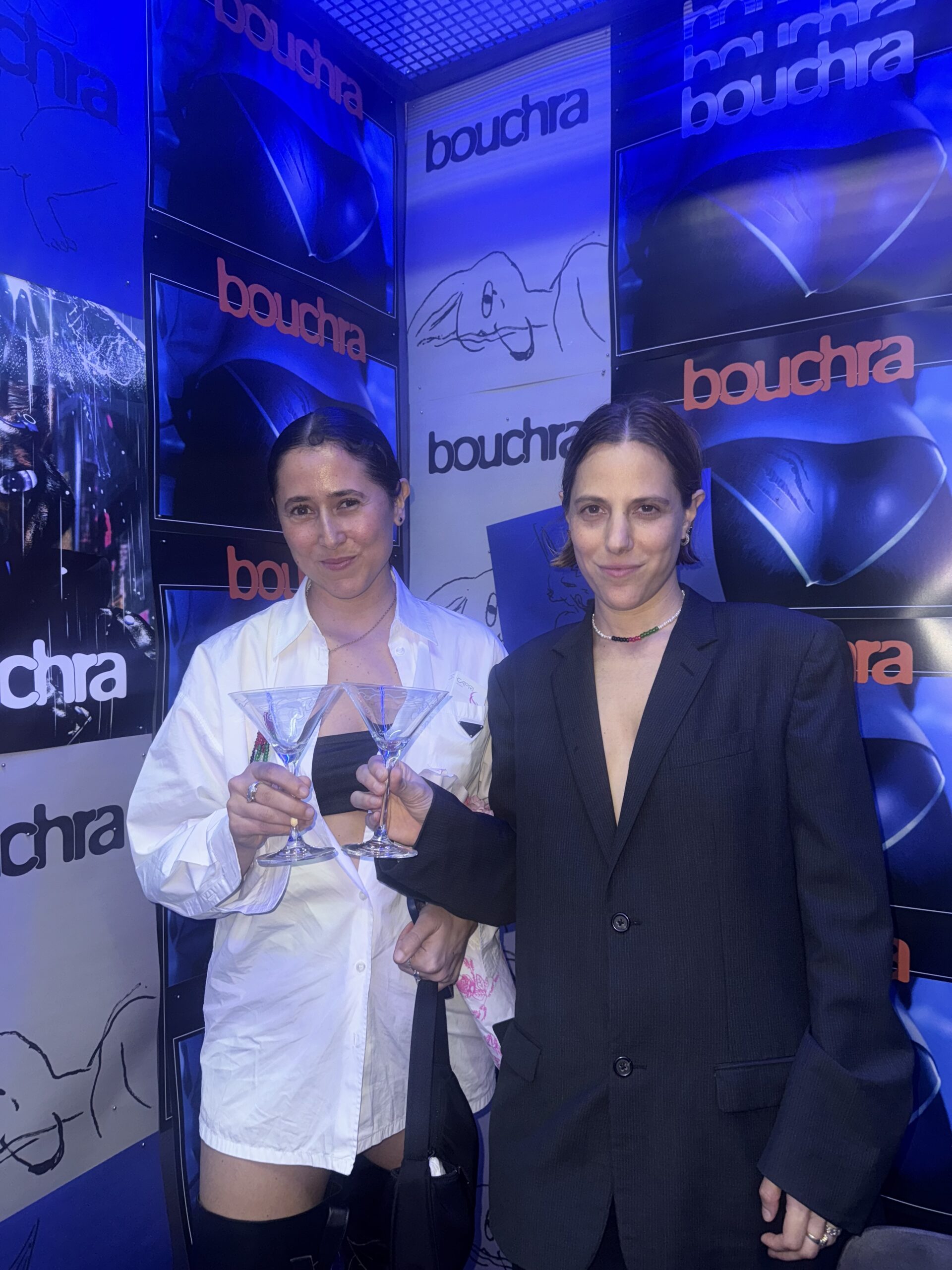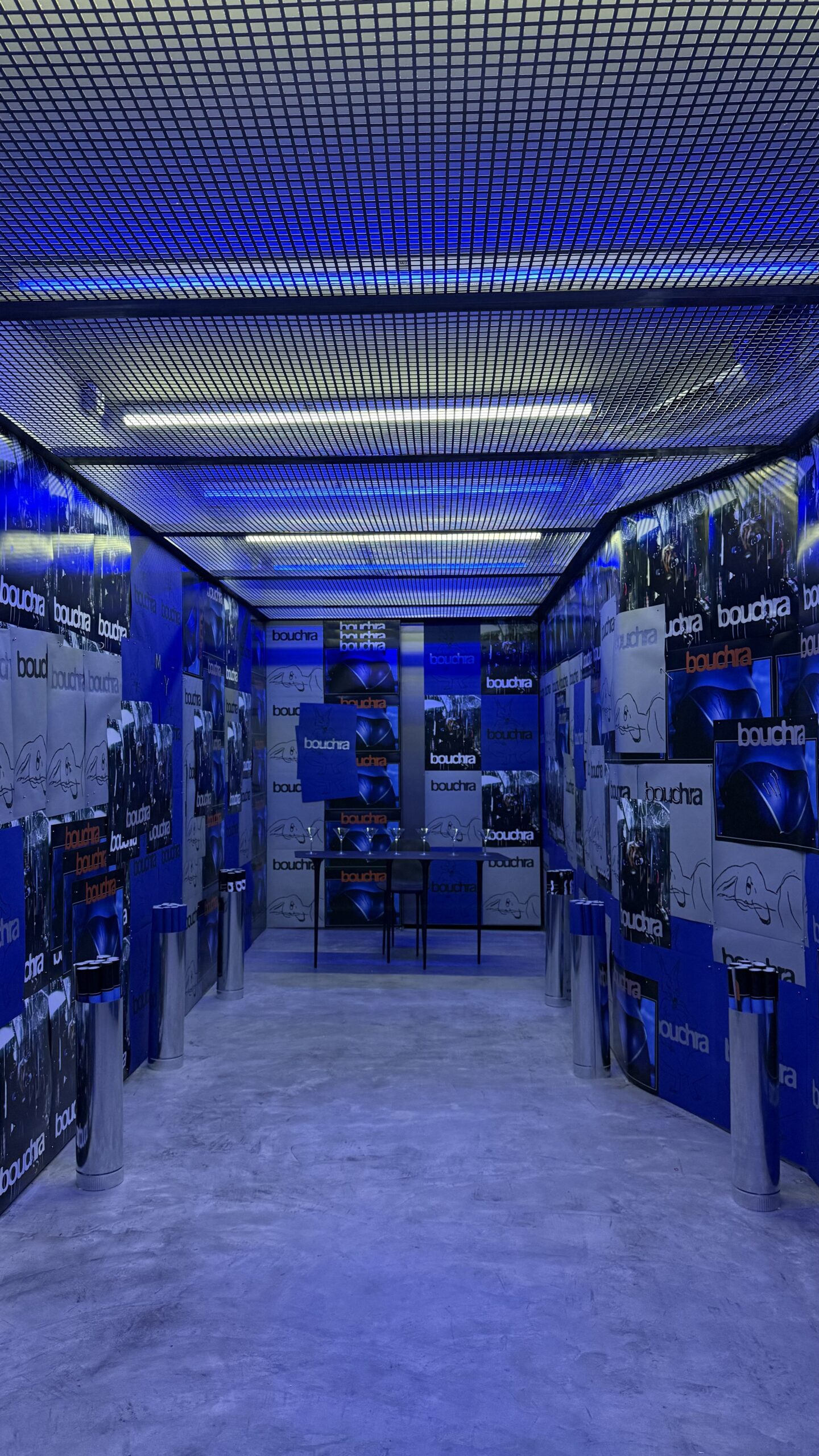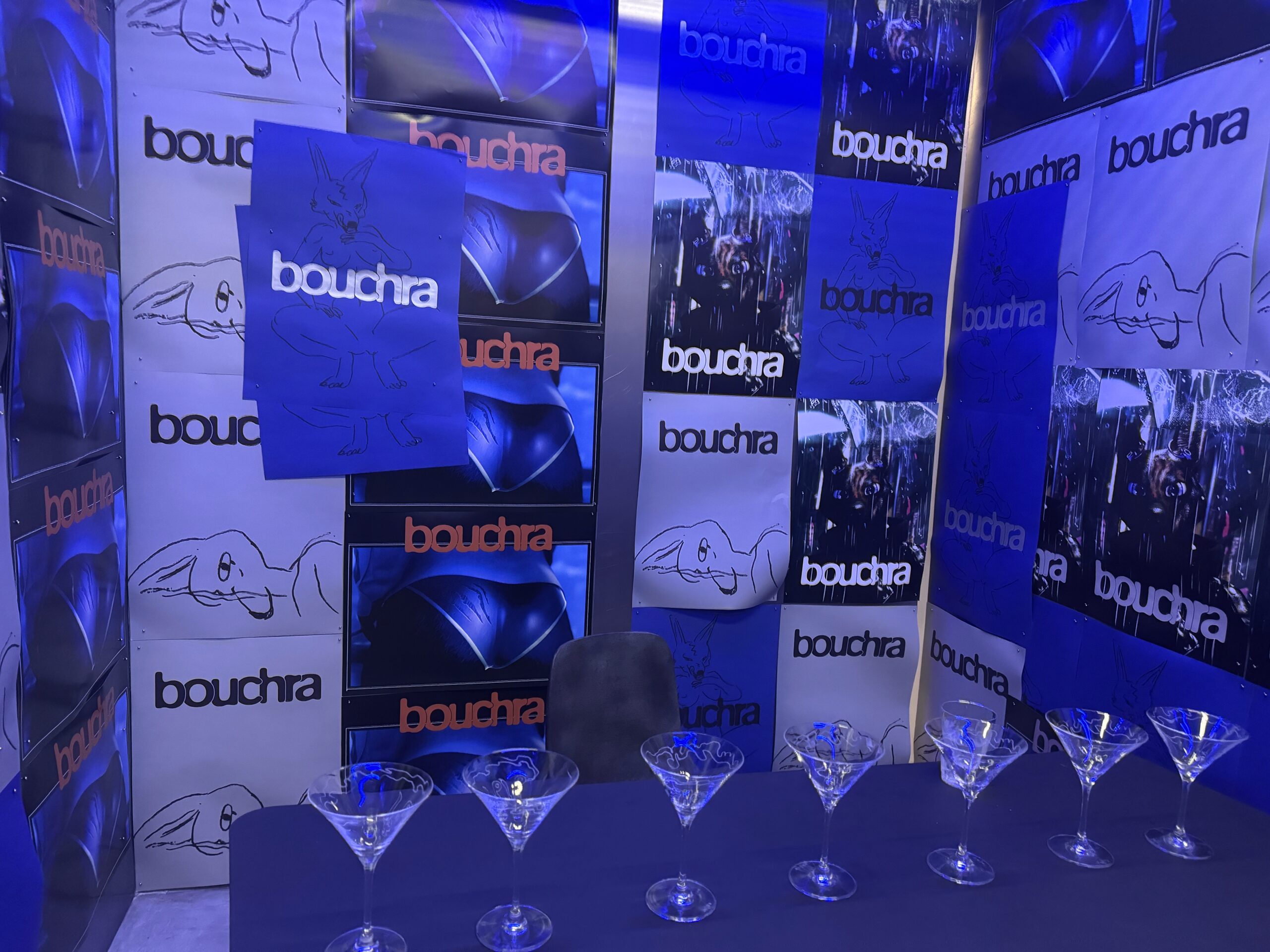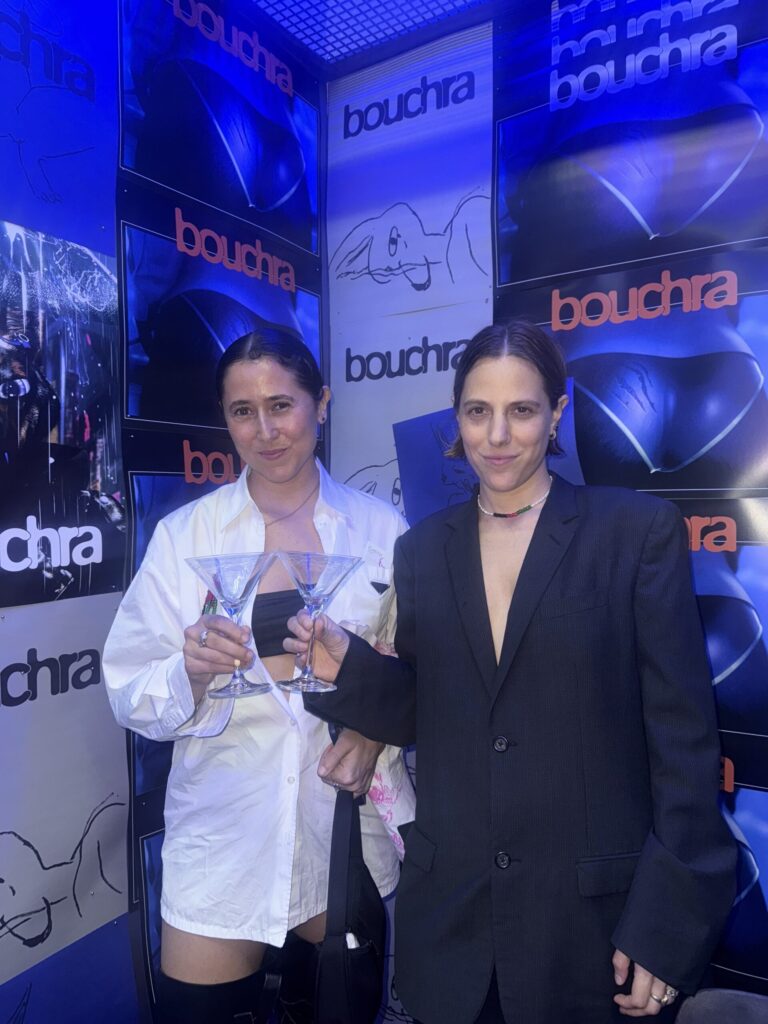

Last week at NYFF, filmmakers Meriem Bennani and Orian Barki debuted Bouchra, an animated feature that follows a New York jackal on a mission to make a movie about coming out to her family in Morocco. It’s a queer coming of age tale: tender, topical, and dare I say, sexy? After the screening, I caught up with the filmmakers over a cigarette at Null Object, a new concept space by Nikki Mirsaeid and Alex Gvojic, whose debut show features lizard-adorned martini glasses and silk screen posters by Bennani and Barki—real life ephemera to accompany an animated feature that has the furries on Letterboxd losing their minds.
———
TAYLORE SCARABELLI: Okay, so wow, I just saw the film—can I borrow a lighter?
ORIAN BARKI: I got you.
MERIEM BENNANI: Thank you for doing this interview.
BARK: Yeah, thank you so much.
SCARABELLI: My pleasure, honestly. Today, I was in the editing room for my first short film I’m making with a friend and—
BENNANI: Alex told me about it.
SCARABELLI: It was an intense day and it was cool to see your movie and also hear you guys talk about working together and that dynamic. Because I think co-directing is so beautiful, but can also be complicated. How did that feel for you guys? I mean you’ve done it before, obviously…
BARKI: I mean, it wasn’t just us collaborating. We were collaborating also with John Michael and Jason so it was even newer. The fun part about collaboration is being surprised by what’s coming out of it. It keeps you curious, and interested, and you’re less in control. But part of making a collaboration fun is accepting it, and loving it, and being curious about it. But we also ended up breaking up, so it was complicated.
BENNANI: I’m more from the art world where I usually do everything on my own I think it was really healthy to work with Danny and a bigger team. It’s very humbling. When work alone, I become a monster in a way because you don’t get push back and stuff. Not to be cheesy, but on a personal level, it really helps you grow and accept criticism.
LEILA WEINRAUB: Bum, bum, bum.
BENNANI: We’re doing an interview.
SCARABELLI: One sec.
BENNANI: Anyways, I think it makes your work better because usually, if you’re doing it for yourself, you just stop where you find the thing. But here, you have to communicate. You have to really know what you want, and also be able to let go of that. Because by the time a shot is done, it’s gone through so many hands, it looks different, and you have to learn to look at it without what you were expecting. And when you can do that, it becomes wonderful.
SCARABELLI: You have to let go a little bit.

BENNANI: Yes, and then you can enjoy just discovering it, and—
BARKI: Discover is such a good word.
BENNANI: You can see it with fresh eyes because it’s not just your work.
SCARABELLI: And it’s interesting because the story is personal to you, Meriem, but it’s also personal to Orian.
BARKI: Definitely. We included a lot of both of us in it. I was going to say, on the personal story level, I think that it’s actually very helpful to collaborate because sometimes it’s hard to tell if something is interesting when you’re in it.
SCARABELLI: Right. And you don’t know if you’re even explaining it properly because you know it so well.
BARKI: Exactly.
BENNANI: Yeah, or if it’s self-conscious. Does it have some just good narrative structure, or is it just someone trying to figure out their feelings? Which can be interesting, but you don’t want to just indulge in that. There’s a balance to find. So we were just bouncing things off each other and also giving each other distance.
SCARABELLI: I was also interested in what you guys spoke about during the Q&A after the New York Film Festival Screening, about the nuance of it making this kind of queer coming of age film without hitting the viewer over the head with this narrative of, “My evil mom,” or whatever.
BARKI: Exactly.
SCARABELLI: Hearing her experience of, “Well, you came out to me, but then I have to come out to the rest of the family, it’s almost obvious, but you don’t often hear that side of the story.
BENNANI: And it’s not about good or bad.
SCARABELLI: Yeah, it’s just life.
BENNANI: There’s this director. She just wants to get her film done. And that’s also selfish in a way because you might want to make something personal, but you don’t have to bring everyone into it unless they want to be part of a project. And so we tried to show that in the film.
SCARABELLI: Right. I really enjoyed the meta aspect of it, and particularly the final animated scene that looks like it’s shot on a handheld camera.
BARKI: This specific scene is one of the scenes that is actually animated after footage that we have. It’s so helpful for the animators also to see the people and how they move. And every time that you dig from the fiction back to reality, it gives you this extra meta layer.
SCARABELLI: I want to talk about the animals because everyone knows your work from your mini series 2 Lizards during the pandemic, which really I think struck a chord with a lot of people because that was such a hard moment to narrativize, and you both did such a great job of it. I think there’s something about turning ourselves into creatures that’s humbling in a way. I wonder if you would speak to that.
BENNANI: I never thought about it like a humbling thing, but you’re right. Everything other than the voices is a representation of reality. As filmmakers, it’s very useful because we need that extra step to start creating a story around something that is real. So it’s a device that’s really helpful and also playful. Although we didn’t play in psychedelic ways with it. We wanted to treat the material with nuance because it’s delicate. So there was tension, using the animals in this way.

SCARABELLI: And the sex scenes were so good. How did you approach that?
BARKI: Well, the first sex scene that we made is actually the second one. The one in Morocco. It starts in animation and then we cut back to the storyboard. Because we started making it and we didn’t know exactly how far we wanted to push it in animation and we were like, actually, the drawings are more fun to look at and we can be more explicit or freaky with them. The animation felt almost like too much. But then the second sex scene that we made, which is the first one you see in the film, the one with the ex-girlfriend, we were like, okay, we know how to approach it—we filmed two friends of ours, so we had a video guide for the animators.
SCARABELLI: Because it’s also, like, how do animals kiss?
BENNANI: It was really hard to figure out because they have long muzzles. But also we were like, can we make animals be fun and sexy and can we tap into the furry community?
SCARABELLI: That’s where I was going with this. The ear biting… I was like, the furries are going to feel so seen.
BARKI: The furries are already on Letterboxd, being like, “Yay!”
BENNANI: It’s true.
SCARABELLI: So this is Nikki and Alex’s first exhibition at Null Object. Obviously you all know each other, how did the exhibition come about?
BENNANI: They asked us if we want to do something. And we knew it would coincide with the New York Film Festival Premiere. So we thought, the film is so digital, let’s do something analog, just posters, and people can grab them for free.
BARKI: No screens.
BENNANI: Just something fun and interactive.
SCARABELLI: And collectible. How many did you print?
BENNANI: So there’s four variations. Some of them have a layer of silk screen, so they’re the fancier ones. I think there’s 300 of each.
SCARABELLI: And then the glasses…
BENNANI: And then, yeah, there’s martini glasses with a 2 Lizards drawing from Orian.
SCARABELLI: Who are smoking.
BARKI: Who are smoking.
BENNANI: We love martinis.
BARKI: And also in the film, after she sends the letter to her parents in the flashback scene, her girlfriend says, what do you want to do? Are you okay? And she says, “I just want spaghetti, a martini, and a cigarette.” So we tied it all together.
SCARABELLI: Perfect.

